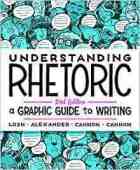Student review of textbook provides valuable feedback
 When was the last time you received honest feedback about your textbook from students? For many authors, feedback is provided during production from a team of editors. For a luckier few, instructor and student review may be part of the production process, especially for first editions. But rarely do authors have direct feedback from the students their book is intended to serve post-adoption.
When was the last time you received honest feedback about your textbook from students? For many authors, feedback is provided during production from a team of editors. For a luckier few, instructor and student review may be part of the production process, especially for first editions. But rarely do authors have direct feedback from the students their book is intended to serve post-adoption.
Dr. Elizabeth Losh, associate professor of English and American Studies at William & Mary University, and author of Understanding Rhetoric: A Graphic Guide to Writing, has made student feedback a key component of her writing process.
Supported by a publisher who shares her value of student review, the first edition of Understanding Rhetoric was reviewed by more than 50 students and more than 20 instructors. An entire chapter on collaboration was added to the second edition of the book based on feedback from those reviewers.
As Losh prepares for the third edition of the book, she continues to identify opportunities for improvement. In fact, she periodically takes courses at the community college to “maintain a student perspective” when writing. But an opportunity of greater significance presented itself to her during this latest revision process, when Losh was approached by the head of a student-run committee at Kennesaw State University offering to provide feedback on the second edition of the book.
“The students were both critical and constructive,” she said. They had divided up work as a team, presented substantive arguments for proposed revisions, and even had a presentation with handouts prepared in advance of the meeting, she said.
The comic book style of her textbook “adds complexity” to the review process, according to Losh, but the students were undaunted and offered suggestions for redesign of splash pages and character revisions, such as ones that better represented the experiences of online and hybrid student audiences for the book.
Losh has already begun implementing the feedback into her third edition efforts.
For other authors looking for this type of feedback on their textbooks, Losh said the key is that discussion about revision should be a learning experience for students, and, more specifically, something of value to the student.
Losh believes that the subject matter of the book itself, rhetoric, may have encouraged students to apply their learning in an effort to persuade her, as the author, to make changes. She also saw application of the collaboration skills from the new second edition chapter in the student efforts. But more significantly, she credits the instructor influence on a student mindset that “if you don’t like the world, change it.”
 Eric Schmieder is the Membership Marketing Manager for TAA. He has taught computer technology concepts to curriculum, continuing education, and corporate training students since 2001. A lifelong learner, teacher, and textbook author, Eric seeks to use technology in ways that improve results in his daily processes and in the lives of those he serves. His latest textbook, Web, Database, and Programming: A foundational approach to data-driven application development using HTML, CSS, JavaScript, jQuery, MySQL, and PHP, First Edition, is available now through Sentia Publishing.
Eric Schmieder is the Membership Marketing Manager for TAA. He has taught computer technology concepts to curriculum, continuing education, and corporate training students since 2001. A lifelong learner, teacher, and textbook author, Eric seeks to use technology in ways that improve results in his daily processes and in the lives of those he serves. His latest textbook, Web, Database, and Programming: A foundational approach to data-driven application development using HTML, CSS, JavaScript, jQuery, MySQL, and PHP, First Edition, is available now through Sentia Publishing.
Please note that all content on this site is copyrighted by the Textbook & Academic Authors Association (TAA). Individual articles may be reposted and/or printed in non-commercial publications provided you include the byline (if applicable), the entire article without alterations, and this copyright notice: “© 2024, Textbook & Academic Authors Association (TAA). Originally published on the TAA Blog, Abstract on [Date, Issue, Number].” A copy of the issue in which the article is reprinted, or a link to the blog or online site, should be mailed to Kim Pawlak P.O. Box 337, Cochrane, WI 54622 or Kim.Pawlak @taaonline.net.

